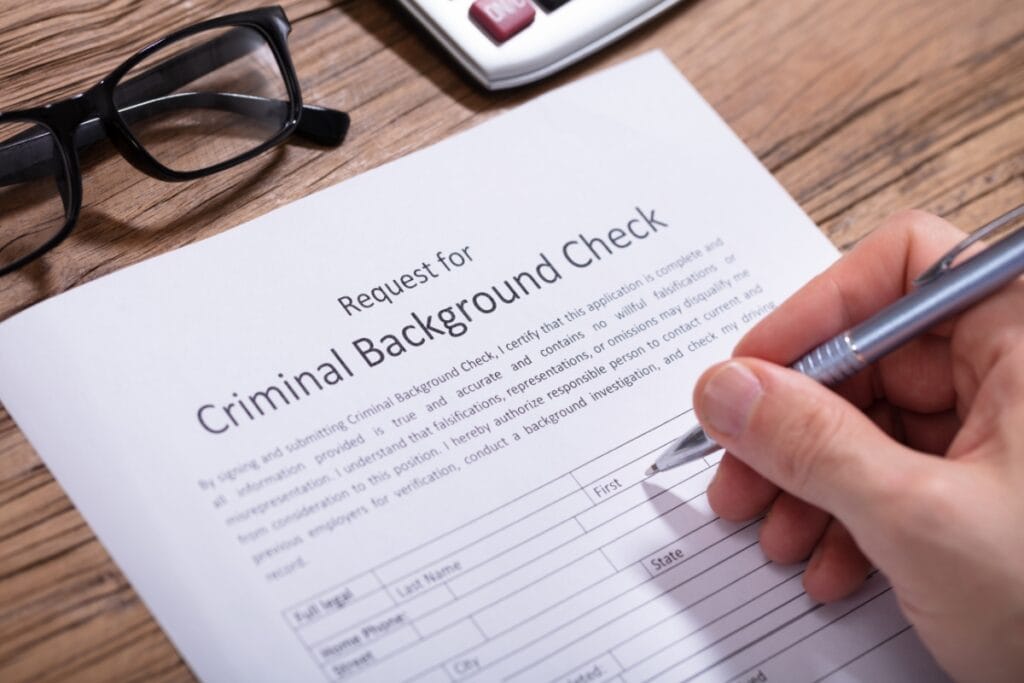Are you an employer wondering how to make safer hiring decisions? Background checks are crucial for protecting your company and employees. This article will explain what background checks for hiring entail, why they’re necessary, and how to implement them effectively. You’ll learn about different types of checks, analyzing results, and communicating procedures to candidates. By the end, you’ll have the knowledge to enhance your hiring process and make more informed decisions about potential employees.
Background Checks for Hiring: Avoid Costly Bad Hires
What Is a Background Check for Hiring?

A background check for hiring is a crucial employment screening service that provides valuable information about job candidates. It helps employers make informed decisions, verify credentials, and ensure workplace safety. Common misconceptions exist about the scope and legality of these checks, including “ban the box” laws and sex offender database searches. Understanding the definition, purpose, and limitations of background checks is essential for effective hiring practices.
Definition and Purpose
A background check for hiring is a comprehensive process employers use to verify a job candidate‘s information and assess their suitability for a position. This recruitment tool examines various aspects of an individual’s history, including criminal records, employment history, education credentials, and sometimes credit reports. The primary purpose is to ensure workplace safety, reduce turnover, and make informed hiring decisions.
Background checks serve multiple purposes in the hiring process:
- Verify candidate-provided information
- Assess potential risks to the company
- Ensure compliance with industry regulations
- Minimize liability and protect company assets
- Screen for behaviors that may impact job performance
These screenings may also include drug tests and tax compliance checks, depending on the position and industry requirements.
Common Misconceptions About Background Checks
Many employers harbor misconceptions about background checks for hiring, often leading to potential legal pitfalls. One common misunderstanding is that all background checks provide comprehensive information, including a complete criminal history. In reality, investigation services must comply with various regulations, and certain records may be restricted or unavailable depending on the jurisdiction.
Another widespread misconception is that employers can freely conduct background and credit checks for employment without restrictions. However, legal advice is crucial, as there are strict guidelines governing the use of these checks to prevent discrimination. Employers must obtain written consent from candidates and follow specific procedures when using background check information in hiring decisions:
- Obtain written consent from the candidate
- Provide a copy of the background check report
- Allow the candidate to dispute any inaccuracies
- Follow adverse action procedures if denying employment based on the results
- Comply with state and federal laws regarding the use of background check information
Why Employers Need Background Checks for Hiring

Employers conduct background checks to safeguard company interests, ensure workplace safety, and maintain organizational integrity. These screenings help management verify education credentials, assess credit history, and evaluate potential risks. By thoroughly vetting candidates, companies can create a secure environment, protect assets, and uphold their reputation in the industry.
Protecting Company Interests
Background checks play a crucial role in protecting company interests during the onboarding process. Human resource management teams utilize these screenings to verify candidates’ qualifications, driving records for positions involving vehicle operation, and criminal history, including any felony convictions. This comprehensive approach helps organizations mitigate risks and maintain industry-leading standards in their hiring practices.
By conducting thorough background checks, employers can safeguard their assets, reputation, and workplace culture. These screenings enable companies to make informed decisions about potential hires, ensuring they align with organizational values and possess the necessary qualifications. Ultimately, this proactive approach to hiring contributes to a safer, more productive work environment and helps protect the company‘s long-term interests.
Ensuring a Safe Work Environment
Employers implement comprehensive background check policies to ensure a safe work environment for all employees. Pre-employment checks, including credential verification and employment history validation, help organizations identify potential risks and maintain workplace security. By thoroughly vetting candidates, companies can reduce the likelihood of workplace violence, theft, or other safety concerns.
Employment verification checks play a crucial role in confirming a candidate‘s work history and qualifications. These screenings allow employers to make informed decisions about potential hires, ensuring they possess the necessary skills and experience for the job. By prioritizing safety through rigorous background checks, organizations create a secure and productive workplace atmosphere that benefits both employees and the company as a whole.
| Background Check Component | Purpose | Impact on Workplace Safety |
|---|---|---|
| Criminal History Check | Identify potential risks | Reduce likelihood of workplace violence |
| Employment Verification | Confirm work history | Ensure qualified personnel |
| Credential Validation | Verify qualifications | Maintain professional standards |
Maintaining Organizational Integrity
Employers maintain organizational integrity through comprehensive background checks, which include verifying credit scores and immigration status. These screenings help companies assess candidates’ financial responsibility and legal eligibility to work, ensuring a productive and compliant workforce. By conducting thorough evaluations, employers can make informed decisions that align with their organization‘s values and standards.
Background checks also play a crucial role in safeguarding company assets and productivity. Employers may utilize GPS tracking for positions involving company vehicles, ensuring responsible use and accurate reporting. This comprehensive approach to screening helps organizations build a trustworthy team, minimize risks, and maintain a high level of integrity in their operations.
| Background Check Component | Purpose | Impact on Organizational Integrity |
|---|---|---|
| Credit Score Verification | Assess financial responsibility | Ensure trustworthy handling of company resources |
| Immigration Status Check | Verify legal work eligibility | Maintain compliance with employment laws |
| GPS Tracking (for relevant positions) | Monitor company vehicle usage | Enhance accountability and resource management |
Types of Background Checks Relevant for Hiring

Employers utilize various background check types as essential tools in their employment screening process. These checks include criminal history, employment history verification, education verification, reference checks, and credit history checks. Each type offers unique insights, allowing employers to thoroughly vet candidates’ experience and qualifications. Background check companies provide comprehensive services to streamline this crucial vetting process.
Criminal History Checks
Criminal history checks are a critical component of employment background screening, providing valuable insights into a candidate‘s past legal issues. These checks, conducted in compliance with Equal Employment Opportunity Commission guidelines, help employers identify potential risks and make informed hiring decisions. By examining public records for criminal convictions, employers can assess whether a candidate‘s history aligns with the requirements of the position and organizational values.
Pre-employment screening that includes criminal history checks can help prevent fraud and protect company assets. While an employment history search reveals a candidate‘s professional background, criminal checks offer a more comprehensive view of their personal conduct. Employers must balance the need for thorough screening with fair hiring practices, ensuring that criminal history information is used appropriately and in accordance with relevant laws and regulations.
Employment History Verification
Employment history verification is a crucial component of running background checks for hiring. This process involves contacting previous employers to confirm a candidate‘s work experience, job titles, and dates of employment. By conducting thorough employment reference checks, employers can validate the accuracy of a candidate‘s resume and gain insights into their professional reputation.
While verifying employment history, employers may also gather information about a candidate‘s job performance, reason for leaving, and eligibility for rehire. This comprehensive approach helps identify any discrepancies or potential red flags, such as gaps in employment or inconsistencies in reported job duties. Additionally, for positions involving driving responsibilities, employers may include motor vehicle record checks to ensure candidates have a clean driving history and are suitable for roles that require operating company vehicles.
Education Verification
Education verification is a crucial component of background checks, allowing employers to confirm candidates’ academic credentials and reduce the risk of hiring fraud. This process involves contacting educational institutions to verify degrees, diplomas, and certifications, ensuring that applicants possess the knowledge and qualifications they claim. For positions requiring specific licenses or specialized training, particularly in Latin America, thorough education verification helps maintain compliance and mitigate potential risks.
Employers who conduct background checks including education verification gain valuable insights into candidates’ academic history and qualifications. This process helps identify discrepancies between reported and actual educational achievements, protecting organizations from potential liability and ensuring that hired individuals possess the necessary skills for their roles. By verifying educational credentials, employers can make more informed hiring decisions and maintain a workforce with the appropriate knowledge and expertise.
Reference Checks
Reference checks are a crucial component of background screening services, providing employers with valuable insights into a candidate‘s work history and performance. During the hiring process, employers contact previous supervisors or colleagues to verify employment details and gather data on the applicant’s skills, work ethic, and professional behavior. This step helps organizations make informed decisions and reduce the risk of hiring unsuitable candidates.
Effective reference checks involve gathering specific, job-related information through carefully crafted questions. Employers often use standardized forms or structured interviews to document the references’ responses, ensuring consistency and compliance with legal requirements. By incorporating reference checks into their background screening process, companies can validate the information provided in resumes and interviews, ultimately improving the quality of their hires and reducing turnover rates.
Credit History Checks
Credit history checks are a crucial component of employment background screening, governed by the Fair Credit Reporting Act (FCRA) and General Data Protection Regulation (GDPR). Human resources professionals utilize these checks to assess a candidate‘s financial responsibility, especially for positions involving financial management or access to sensitive information. While not directly related to employment history verification, credit checks provide valuable insights into an applicant’s reliability and potential risk factors.
Employers must obtain written consent from candidates before conducting credit history checks, ensuring compliance with FCRA regulations. These checks typically reveal information such as outstanding debts, payment history, and bankruptcies, which may influence hiring decisions for certain roles. However, it’s essential for human resources departments to balance the need for thorough screening with fair employment practices, considering the relevance of credit information to the specific job requirements:
| Credit Check Component | Relevance to Employment | Compliance Considerations |
|---|---|---|
| Outstanding Debts | Financial responsibility assessment | FCRA compliance |
| Payment History | Reliability and consistency evaluation | GDPR compliance (if applicable) |
| Bankruptcies | Potential risk factor for financial roles | Job relevance assessment |
How Background Checks Impact Hiring Decisions

Background checks significantly influence hiring decisions by providing crucial insights into candidates’ histories. Employers evaluate suitability using employment history reports and artificial intelligence tools, while navigating legal implications and data security concerns. This process requires balancing fairness with safety, ensuring consent, and adhering to regulations. Understanding these factors helps organizations make informed decisions and maintain a secure workplace.
Evaluating Candidate Suitability
Organizations conducting background checks evaluate candidate suitability by thoroughly examining employment history, criminal records, and credit reports. This due diligence process helps employers assess potential risks and ensure candidates align with company values and job requirements. Pre-employment credit checks provide insights into financial responsibility, particularly for positions involving financial management or access to sensitive information.
When evaluating candidates, employers consider the relevance of any convictions to the position and assess the overall impact on job performance. Background checks enable organizations to make informed decisions, balancing fairness with workplace safety and security. This comprehensive approach to candidate evaluation helps companies build a trustworthy and qualified workforce:
| Evaluation Factor | Importance | Impact on Hiring Decision |
|---|---|---|
| Employment History | High | Verifies experience and reliability |
| Criminal Record | Medium to High | Assesses potential risks |
| Credit Report | Low to Medium | Indicates financial responsibility |
Understanding the Legal Implications
Employers conducting background screening for employment must navigate complex legal implications to ensure regulatory compliance. The Office of Foreign Assets Control (OFAC) mandates checks against its sanctions list, while federal and state laws govern the use of criminal records and credit reports in hiring decisions. Understanding these legal requirements is essential for employers to avoid discrimination claims and maintain fair hiring practices.
An employment check must be conducted in accordance with the Fair Credit Reporting Act (FCRA) and state-specific regulations. Employers must obtain written consent from candidates before initiating background checks and provide adverse action notices if negative information impacts hiring decisions. By prioritizing legal compliance in their background screening processes, organizations can protect themselves from potential lawsuits while making informed hiring choices.
Balancing Fairness and Safety
Employers must balance fairness and safety when conducting background checks for hiring. They consider factors such as company culture, workplace health, and credit history to make informed decisions. Reference checks provide valuable insights into a candidate‘s work ethic and performance, while court records may reveal relevant legal issues. This balanced approach ensures a safe work environment while giving candidates fair consideration.
Organizations often face challenges in maintaining this equilibrium. They must weigh the importance of protecting their employees and assets against the risk of discriminating against qualified candidates. To achieve this balance, employers should:
- Develop clear, consistent background check policies
- Evaluate each candidate‘s situation individually
- Consider the relevance of findings to the specific job role
- Provide opportunities for candidates to explain negative results
- Regularly review and update screening processes to ensure fairness
Steps to Implement Background Checks in Your Hiring Process

Implementing background checks in the pre-employment screening process requires careful planning and execution. Employers must establish a comprehensive background check policy, understand compliance with laws and regulations, and select reliable background check solutions. These steps help organizations conduct thorough interviews, prevent theft, and maintain a safe workplace while adhering to relevant regulations.
Establishing a Background Check Policy
Establishing a comprehensive background check policy is crucial for employers seeking to verify employment history and maintain a professional workplace. This policy should outline the types of background check services to be used, including searches for misdemeanors and other relevant records. A well-defined policy ensures consistency in the screening process and helps organizations comply with applicable laws.
When creating a background check policy, employers must consider the specific requirements of their industry and the positions they are filling. The policy should clearly state which checks will be conducted, how the information will be used, and the steps taken to protect candidates’ privacy. By implementing a thorough policy, organizations can effectively screen potential employees while minimizing legal risks:
| Policy Component | Description | Purpose |
|---|---|---|
| Types of Checks | Criminal, employment, education | Comprehensive screening |
| Legal Compliance | FCRA, EEOC guidelines | Avoid discrimination claims |
| Consent Procedures | Written authorization forms | Ensure candidate awareness |
Understanding Compliance With Laws and Regulations
Employers conducting background checks must understand and comply with various laws and regulations governing the process. These include the Fair Credit Reporting Act (FCRA), which requires employers to obtain written consent before conducting an employment history check or accessing a candidate‘s criminal record. Additionally, employers must adhere to state-specific laws that may limit the use of certain information, such as social security numbers, in hiring decisions.
Compliance also extends to Equal Employment Opportunity Commission (EEOC) guidelines, which aim to prevent discrimination in hiring practices. Employers should establish clear policies for evaluating criminal records and ensure that any adverse actions based on background check results are job-related and consistent with business necessity. By staying informed about these regulations and implementing compliant procedures, organizations can protect themselves from legal challenges while maintaining fair hiring practices.
Selecting a Reliable Background Check Provider
Selecting a reliable background check provider is crucial for employers implementing thorough screening processes. Companies should evaluate potential providers based on their accuracy, turnaround time, and compliance with relevant laws and regulations. A reputable provider offers comprehensive services, including employment verification, criminal record checks, and education validation, ensuring a complete assessment of candidates.
Employers must consider the provider’s data security measures and customer support when making their selection. A trustworthy background check company maintains strict confidentiality protocols and offers clear communication channels for addressing inquiries or concerns. By choosing a reliable provider, organizations can streamline their hiring process, reduce liability risks, and make informed decisions about potential employees.
Analyzing Background Check Results

Analyzing background check results is a critical step in the hiring process. Employers must interpret findings in context, address any red flags, and follow best practices for decision-making. This section explores how to evaluate results effectively, handle potential concerns, and make informed hiring choices while maintaining compliance with relevant laws and regulations.
Interpreting Findings in Context
When analyzing background check results, employers must interpret findings within the context of the specific job role and company requirements. They should consider the relevance of any discovered information to the position, evaluating how it may impact job performance or workplace safety. This contextual approach ensures a fair assessment of candidates while maintaining organizational standards.
Employers should establish clear criteria for evaluating background check results, taking into account factors such as the severity and recency of any offenses, as well as the candidate‘s overall qualifications and potential contributions to the company. By implementing a structured evaluation process, organizations can make consistent and informed hiring decisions:
| Factor | Consideration | Impact on Decision |
|---|---|---|
| Job Relevance | Relationship between findings and position requirements | High |
| Time Since Incident | Recency of any negative findings | Moderate |
| Severity of Issue | Potential impact on workplace safety or performance | High |
How to Address Red Flags
When addressing red flags in background check results, employers should approach the situation systematically and objectively. They must first verify the accuracy of the information and assess its relevance to the specific job role. Employers should then engage in a dialogue with the candidate, allowing them to provide context or explanation for any concerning findings.
Organizations should establish clear guidelines for evaluating red flags, considering factors such as the nature of the offense, time elapsed, and potential impact on job performance. This approach ensures consistency in decision-making and helps maintain fairness in the hiring process. Employers must also document their reasoning for any adverse actions taken based on background check results:
| Red Flag Type | Evaluation Criteria | Action Steps |
|---|---|---|
| Criminal Record | Severity, relevance to job, time elapsed | Verify information, discuss with candidate |
| Employment Gap | Duration, reason, skills maintained | Request explanation, assess impact on qualifications |
| Credit Issues | Relevance to position, current financial status | Consider job requirements, evaluate risk |
Best Practices for Decision Making
Employers should establish clear, consistent criteria for evaluating background check results to ensure fair decision-making. They must consider the relevance of findings to the specific job role, assessing how any discovered information might impact performance or workplace safety. This approach allows organizations to make informed hiring choices while maintaining compliance with employment laws and regulations.
When analyzing results, employers should document their reasoning and consult with legal counsel if necessary. They must also provide candidates with an opportunity to explain any concerning findings before making final decisions. By following these best practices, companies can mitigate risks associated with negligent hiring while maintaining a fair and transparent hiring process.
Communicating Background Check Procedures to Candidates

Effective communication of background check procedures is crucial for maintaining transparency and building candidate trust. Employers must inform applicants about their rights during the screening process and establish clear protocols for handling discrepancies in reports. This approach ensures compliance with regulations while fostering a positive candidate experience throughout the hiring process.
Transparency and Candidate Trust
Employers establish trust with candidates by maintaining transparency throughout the background check process. They provide clear information about the types of checks being conducted, the reasons for these checks, and how the results will be used in hiring decisions. This openness helps candidates feel more comfortable with the screening process and demonstrates the employer’s commitment to fairness.
Transparent communication also includes informing candidates about their rights regarding background checks. Employers explain how candidates can review their reports, dispute any inaccuracies, and provide additional context if needed. By fostering open dialogue and respecting candidates’ privacy concerns, organizations create a positive experience that enhances their reputation as fair and ethical employers.
Informing Candidates About Their Rights
Employers must inform candidates about their rights regarding background checks, as mandated by the Fair Credit Reporting Act (FCRA). This includes notifying applicants in writing that a background check will be conducted and obtaining their written consent. Employers should also provide candidates with a copy of “A Summary of Your Rights Under the Fair Credit Reporting Act” document, ensuring they understand their legal protections throughout the screening process.
Organizations should clearly communicate to candidates their right to dispute any inaccuracies found in their background check reports. Employers must provide applicants with a copy of the report and allow them a reasonable opportunity to respond before making any adverse hiring decisions based on the findings. This transparent approach not only ensures compliance with regulations but also fosters trust and fairness in the hiring process.
Handling Discrepancies in Reports
When employers encounter discrepancies in background check reports, they must address them promptly and professionally. Organizations should establish a clear protocol for handling such issues, including contacting the candidate to discuss the discrepancies and providing them with an opportunity to explain or provide additional information. This approach ensures fairness in the hiring process and demonstrates the employer’s commitment to accuracy and transparency.
Employers must also document all steps taken to resolve discrepancies, including any communication with the candidate and the background check provider. If the discrepancy results in an adverse hiring decision, the employer must follow the adverse action process outlined in the Fair Credit Reporting Act, providing the candidate with proper notification and the opportunity to dispute the findings. By handling discrepancies carefully and systematically, organizations can maintain compliance with regulations and protect themselves from potential legal challenges.
Enhancing Your Hiring Process Beyond Background Checks

While background checks are crucial, employers can further enhance their hiring process by incorporating skills assessments, evaluating cultural fit, and maintaining continuous candidate engagement. These additional steps provide a more comprehensive view of potential hires, ensuring not only their qualifications but also their alignment with the organization‘s values and long-term success. By implementing these strategies, employers can make more informed decisions and improve overall hiring outcomes.
Incorporating Skills Assessments
Employers can enhance their hiring process by incorporating skills assessments alongside background checks. These assessments provide objective data on candidates’ abilities, allowing organizations to evaluate technical competencies and problem-solving skills relevant to specific job roles. By implementing targeted tests or simulations, companies gain valuable insights into a candidate‘s potential performance and fit within the team.
Skills assessments complement background checks by offering a more comprehensive view of candidates’ qualifications. While background checks verify past experiences and credentials, skills tests demonstrate current capabilities and readiness for the position. This dual approach helps employers make more informed decisions, reducing the risk of hiring mismatches and improving overall team productivity and success.
Evaluating Cultural Fit
Evaluating cultural fit involves assessing how well a candidate‘s values, beliefs, and behaviors align with the organization‘s culture. Employers can use structured interviews, situational judgment tests, and personality assessments to gauge a candidate‘s potential fit within the company. This process helps ensure that new hires will thrive in the work environment and contribute positively to team dynamics.
While background checks verify a candidate‘s history, cultural fit evaluations provide insights into their future potential within the organization. Employers should balance the importance of skills and experience with cultural alignment, recognizing that a good fit can lead to increased job satisfaction, productivity, and employee retention. By incorporating cultural fit assessments into the hiring process, companies can build stronger, more cohesive teams that drive long-term success.
Continuous Candidate Engagement
Continuous candidate engagement extends beyond the initial background check and interview process, fostering ongoing communication throughout the hiring journey. Employers who maintain regular contact with potential hires demonstrate their commitment to transparency and respect for candidates’ time. This approach helps build trust, keeps candidates informed about their application status, and allows organizations to address any concerns promptly.
Effective continuous engagement strategies include providing timely updates, offering opportunities for candidates to ask questions, and sharing relevant company information. By maintaining open lines of communication, employers can ensure that top candidates remain interested in the position and reduce the risk of losing qualified applicants to competitors. This proactive approach to candidate relationships enhances the overall hiring experience and contributes to a positive employer brand.
Recent Trends in Background Checks for Hiring

Recent trends in background checks for hiring reflect the evolving landscape of employment screening. Technological advancements have streamlined the process, while social media screening provides additional insights into candidates. Artificial intelligence is playing an increasingly significant role, enhancing efficiency and accuracy in background check procedures. These developments offer employers new tools to make informed hiring decisions while navigating complex legal and ethical considerations.
The Rise of Technology in Background Checks
Technology has revolutionized background checks, streamlining the process and enhancing accuracy. Employers now utilize advanced software platforms that integrate multiple data sources, allowing for faster and more comprehensive screenings. These digital tools enable real-time updates and automated compliance checks, reducing the risk of human error and ensuring adherence to evolving regulations.
Artificial intelligence and machine learning algorithms are increasingly employed to analyze vast amounts of data quickly and efficiently. These technologies can identify patterns and potential red flags that human reviewers might miss, providing employers with more nuanced insights into candidates’ backgrounds. As a result, organizations can make more informed hiring decisions while reducing the time and resources required for thorough screenings.
Social Media Screening Techniques
Social media screening has become an increasingly common practice in background checks for hiring. Employers now review candidates’ public social media profiles to gain additional insights into their character, professionalism, and potential fit within the organization. This technique allows companies to assess a candidate‘s online presence and behavior, providing valuable information that may not be apparent through traditional screening methods.
However, social media screening raises ethical and legal concerns regarding privacy and discrimination. Employers must establish clear guidelines for conducting these checks, ensuring they comply with relevant laws and regulations. Organizations should focus on job-related information and avoid making decisions based on protected characteristics such as race, religion, or political affiliations. By implementing responsible social media screening practices, employers can enhance their hiring process while respecting candidates’ privacy rights.
The Role of Artificial Intelligence
Artificial intelligence is revolutionizing background checks for hiring, enhancing efficiency and accuracy in the screening process. AI-powered algorithms can quickly analyze vast amounts of data from multiple sources, identifying patterns and potential red flags that human reviewers might miss. This technology enables employers to make more informed decisions while reducing the time and resources required for thorough screenings.
As AI continues to evolve, it offers sophisticated predictive analytics capabilities for background checks. These advanced systems can assess a candidate‘s likelihood of success in a specific role based on historical data and performance metrics. However, employers must carefully navigate the ethical implications of using AI in hiring decisions, ensuring compliance with fair employment practices and avoiding unintended bias in the screening process.
Resources for Employers on Background Checks for Hiring

Employers navigating background checks for hiring can benefit from valuable resources to ensure compliance and effectiveness. Regulatory bodies provide essential guidelines for lawful screening practices. Industry best practices offer insights into efficient and fair processes. Additionally, sector-specific resources help employers tailor their approach to meet unique industry requirements. These tools empower organizations to conduct thorough, compliant background checks while making informed hiring decisions.
Guidelines From Regulatory Bodies
Regulatory bodies provide essential guidelines for employers conducting background checks during the hiring process. The Equal Employment Opportunity Commission (EEOC) offers guidance on using arrest and conviction records in employment decisions, emphasizing the importance of job-relatedness and business necessity. The Federal Trade Commission (FTC) enforces the Fair Credit Reporting Act (FCRA), which outlines specific requirements for obtaining and using consumer reports in employment screening.
Employers should familiarize themselves with these regulatory guidelines to ensure compliance and fair hiring practices. Key considerations include obtaining written consent from candidates, providing pre-adverse action notices, and allowing individuals to dispute inaccurate information. By adhering to these guidelines, organizations can mitigate legal risks and maintain ethical screening processes:
- Review EEOC guidance on criminal background checks
- Understand FCRA requirements for consumer reports
- Implement compliant consent and disclosure procedures
- Establish a fair process for addressing adverse information
- Stay informed about state-specific background check laws
Recommended Best Practices
Employers should implement a standardized background check process that aligns with their organizational needs and legal requirements. This includes developing clear policies on which checks to conduct for specific roles, establishing consistent evaluation criteria, and training hiring managers on interpreting results fairly. By maintaining a uniform approach, companies can ensure equitable treatment of candidates and mitigate risks associated with inconsistent screening practices.
Regular audits of background check procedures are essential to maintain compliance and effectiveness. Employers should periodically review their screening processes, update policies to reflect changes in laws or industry standards, and assess the relevance of collected information to job requirements. Additionally, organizations can benefit from partnering with reputable background check providers who offer ongoing support and updates on best practices in employment screening.
Industry-Specific Resources
Industry-specific resources provide employers with tailored guidance for conducting background checks in their particular sectors. Organizations such as the Society for Human Resource Management (SHRM) offer comprehensive toolkits and best practices for various industries, helping employers navigate unique screening requirements. These resources often include sector-specific checklists, compliance guides, and case studies that address the nuances of background checks in different fields.
Employers can also benefit from industry associations and regulatory bodies that provide specialized resources for background checks. For example, the healthcare sector may refer to guidelines from the Department of Health and Human Services, while financial institutions can consult resources from the Financial Industry Regulatory Authority (FINRA). These industry-specific resources ensure that employers conduct thorough and compliant background checks that align with their sector’s unique needs and regulations:
| Industry | Relevant Resource | Key Focus Areas |
|---|---|---|
| Healthcare | Department of Health and Human Services | Patient safety, credentialing |
| Finance | Financial Industry Regulatory Authority | Financial integrity, regulatory compliance |
| Education | National Association of School Personnel Administrators | Student safety, teacher qualifications |
Frequently Asked Questions
What information is typically included in a background check for hiring?
A typical background check for hiring may include criminal records, employment history, education verification, credit reports, driving records, and reference checks. Some employers also conduct drug screenings or review social media profiles, depending on the position and industry requirements.
Are employers legally required to conduct background checks on job candidates?
Employers are not legally required to conduct background checks on all job candidates. However, certain industries and positions may mandate background screening due to regulatory requirements or safety concerns. Many employers choose to perform checks voluntarily to ensure workplace safety and make informed hiring decisions.
How long does a typical background check take during the hiring process?
A typical background check during the hiring process can take 3-7 business days. However, the duration may vary depending on the depth of the check, the responsiveness of references, and the complexity of the candidate‘s history. Some checks may be completed in 24-48 hours, while others could take several weeks.
Can a candidate‘s job offer be rescinded based on background check results?
Yes, employers can rescind a job offer based on background check results. This typically occurs if the check reveals discrepancies, criminal history, or other information that conflicts with the candidate‘s application or the company‘s hiring criteria. However, employers must follow legal guidelines when making such decisions.
What are the potential consequences of not conducting background checks on new hires?
Failing to conduct background checks on new hires can lead to serious consequences for businesses, including potential workplace safety issues, legal liabilities, financial losses, and damage to company reputation. Hiring individuals with undisclosed criminal histories or falsified credentials can compromise the integrity of the organization and its operations.
Don’t Hire Blind—Secure Your Workforce with Professional Background Checks
Hiring the right employees is critical to your company’s success, security, and reputation, and thorough background checks are your first line of defense. At 4Horsemen Investigation & Security, we provide comprehensive, FCRA-compliant background screenings that uncover criminal history, verify credentials, and assess risk, so you can make informed hiring decisions with confidence. Don’t leave your workforce to chance—invest in due diligence that safeguards your business. Get started today! Call 404-680-0860 or visit our website to learn how our tailored background checks can help you build a safer, more reliable team.






